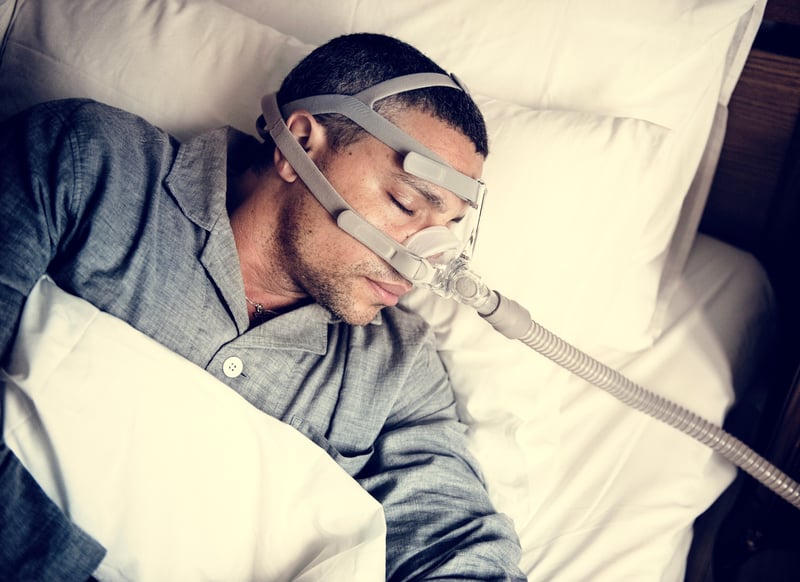Manténgase sano!

- Alan Mozes
- Posted April 7, 2023
Sleep Apnea Might Directly Harm the Brain, Study Finds
Sleep apnea is a very disruptive breathing disorder that's believed to rob millions of Americans of sound, restful sleep.
Now, a small, new study suggests the disorder may also prompt a decline in brain health among middle-aged men who have no other significant health issues.
That decline can manifest as significant memory loss, less impulse control, impaired spatial reasoning, and/or an inability to focus and think clearly.
"Sleep apnea is when your breathing stops and starts while you sleep, due to partial or full occlusion [blockage] of your upper airway,"explained study author Dr. Ivana Rosenzweig, head of the Sleep and Brain Plasticity Centre at King's College London, in the United Kingdom.
Prior research has consistently chalked up any mental impairment observed among obstructive sleep apnea (OSA) patients "to diseases that frequently present jointly with OSA, such as high blood pressure, high cholesterol, obesity, diabetes, cardiovascular and other metabolic diseases,"she said.
"Our study findings suggest that having obstructive sleep apnea may be sufficient for thinking capacity changes to occur as early as in middle age, even in otherwise healthy individuals,"Rosenzweig added.
The research team noted that between 15% and 30% of all men have sleep apnea. Meanwhile, 10% to 15% of women also struggle with the disorder, though Rosenzweig noted that it's less common among premenopausal women relative to their male peers. That gender gap, however, evaporates after menopause.
For the study, the researchers decided to track the mental status of 27 male OSA patients who did not have any additional medical issues of note. No women were included in the analysis.
All were between the ages of 35 and 70. Sixteen patients were diagnosed with mild OSA and 11 had severe sleep apnea. None had a current smoking habit or drinking problem, and no one was obese.
The study authors conducted a battery of what they described as "very sensitive"thought-processing tests among the pool of OSA patients, as well as among a comparison group of seven men who did not have sleep apnea.
The result: patients with either mild or severe sleep apnea fared notably worse on the tests compared with the men who didn't have OSA.
Specifically, OSA patients scored more poorly in terms of short-term visual memory skills, the ability to remain vigilant, the ability to plan and make decisions, and the ability to "read"emotions and social situations.
The more severe their sleep apnea, the worse the OSA patients performed, according to the report.
Rosenzweig emphasized that the investigation is a small "proof-of-concept"study, making it impossible to pin down cause and effect.
Still, the "study suggests that OSA itself is sufficient to kickstart thinking capacity change,"she added.
"This will of course need to be proven in much larger studies, which will follow patients for a longer period of time,"Rosenzweig said.
The findings were published April 6 in the journal Frontiers in Sleep.
Percy Griffin is director of scientific engagement with the Alzheimer's Association. He said that it's been "known for some time that sleep disturbances in general are associated with changes in cognition."
And because sleep apnea is known to disrupt both oxygen flow and sleep quality, Griffin suggested it is "unsurprising"that the disorder might increase the risk for thinking declines.
Even so, he cautioned that the study "is too preliminary and small to inform generalizations"to draw definitive conclusions about what is going on and what might be the best way to minimize the risk of thinking problems.
Dr. Andrew Varga, a sleep medicine physician with the Mount Sinai Integrative Sleep Center in New York City, agreed.
He noted that his entire career has been spent examining a potential connection between sleep apnea and Alzheimer's risk. So, for him, the notion that the two are linked "makes sense."
That, Varga explained, is because all organs -- including the brain -- need oxygen to function, and one of the main characteristics of sleep apnea "is the intermittent hypoxia, meaning the repetitive dips of oxygen levels in your blood."
Still, the latest study was "enormously simple,"he noted, and did not include a follow-up assessment.
"So, all you can really say from this is that sleep apnea appears to perhaps result in worse results on these sorts of tests,"said Varga. "I do believe that sleep apnea is a risk factor. But it's a fairly big leap to draw that conclusion from this paper."
More information
There's more on the possible link between sleep apnea and brain health at the Cleveland Clinic.
SOURCES: Ivana Rosenzweig, MD, PhD, head, Sleep and Brain Plasticity Centre, department of neuroimaging, Institute of Psychiatry, Psychology and Neuroscience, King's College London, U.K.; Percy Griffin, PhD, director, scientific engagement, Alzheimer's Association, Chicago; Andrew Varga, MD, PhD, associate professor, medicine, and sleep medicine physician, Mount Sinai Integrative Sleep Center, New York City; Frontiers In Sleep, April 6, 2023
